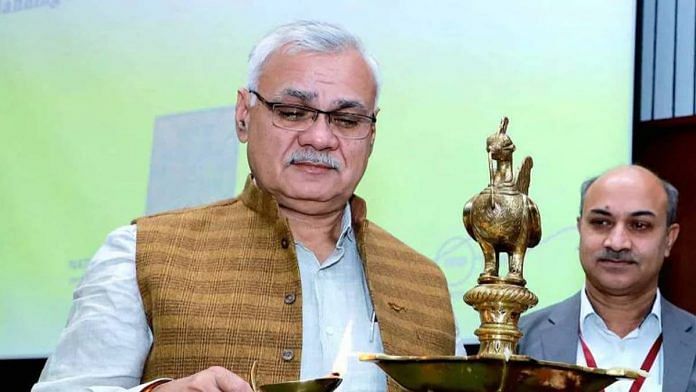With former Union Housing Secretary Durga Shankar Mishra and Odisha’s former Director General of Police Abhay being the latest to be in news for post-retirement appointments, the matter of civil servants and what they do after superannuation is back in public debate.
Years back, while sharing complaints about our bosses, we didn’t think retirement would be as boring as our bosses. While my last-day fantasy pictured a farewell tea in the Vidhana Soudha, a witty speech, and a ride on a Harley Davidson to the Himalayas, nothing of that sort happened. Early retirement was a wise decision, both for the latitude it offered me to pursue professional interests and for ensuring that crossing 60 was a cause for genuine celebration and not one tinged with a fear of the unknown.
However, that was not so with several former colleagues. Many sought and obtained sinecure positions in tribunals and committees, extending their official life for five more years. A few were open about their political leanings and moved into supra advisory positions to their political masters.
Officers joining active electoral politics is something that I encourage. At least there is some honesty about their move. Many argue for a cooling-off time after they retire. I don’t think a cooling-off period will be effective, particularly when someone has political ambitions. It will only push the political engagement underground.
Also read: Punjab’s Vini Mahajan is new drinking water secretary, 8 other secy-level appointments cleared
58 to 60, and the reasons cited
In all fairness to the current bunch, this (the idea of extending employment tenure?) is not a new phenomenon.
The Fifth Central Pay Commission (1997) recommended raising the retirement age to 60 years from 58, citing increased life expectancy, alignment with worldwide trends and to enable those who join the government late, particularly from disadvantaged sections of society, to complete the qualifying service needed to reach the maximum pension limit. It also observed that the impact on employment status would be marginal and that the government would save a considerable sum due to the postponement of retirement benefits for two years.
The Commission also laid down this important caveat:
“There is a tendency on the part of senior officials to seek extension of service up to the age of 60 years. Very often, they are prepared to do anything to obtain such an extension of service. A general increase in the age of superannuation, coupled with a total ban on extension of service except for scientists and medical specialists who could be granted extension of service on a case to case basis up to the age of 64 years, recommended separately, will lead to an enhanced level of objectivity and impartiality among senior administrators.” (Para 128.16(v))
The government sorted out the inconvenient bits and issued an Office Memorandum (May 1998), increasing the retirement age to sixty years for central government employees. The complete ban on extension of service beyond the age of superannuation was restricted only to autonomous bodies and organisations, not to the core secretarial government servants.
Sir Humphrey Appleby would have been proud of this sleight of hand.
Also read: Message to BJP? As Bihar appoints Muslim chief secretary, JD(U) says Nitish ‘doesn’t divide’
Demise of ‘enhanced levels of objectivity and impartiality’
The Fifth Pay Commission’s reasons for service extension bans are as valid today as then. Sadly, however, the ‘enhanced levels of objectivity and impartiality’ stressed by the Commission are not only unimportant to our current politicians, but also considered as old-fashioned, embarrassing attributes that puts at a disadvantage the bureaucrats that practice them. Politicians will gladly marginalise those who abide by such outdated values.
Bureaucrats become used to a life of comfort, of palatial houses, cars, house help and an official support system. These trappings of power are as attractive as power itself, and the continuance in service means retaining these for a few more years, before one passes into dotage. Furthermore, like many Indians, bureaucrats do not plan for an active retirement and fear the prospect of unstructured time, rather than welcome it as an opportunity to develop new hobbies and interests.
Typically, officers get jittery when a year of service remains. Current work is neglected by the distraction of planning for the future. Compromises are made; difficult decisions postponed. They indulge in a survey of sinecure positions that will fall vacant in the ensuing year. A smorgasbord of choices includes tribunals, regulatory commissions, think tanks and other temporary assignments. With adequate planning and provided they do not trod on too many political toes, they get what they want.
Worse still, is the trend to continue senior officers who are politically convenient, in supra senior positions. A chief secretary is elevated to a newly created advisory position, sometimes with cabinet rank, to advise the chief minister. This does not end well most of the time; new chief secretaries feel undermined by the hovering shadow of their predecessor and the friction caused demoralises and confuses officialdom down the line.
Is there a way out? I think not. Criticism of this trend will be ignored. The two primary parties in this undesirable compact, the compliant bureaucrat and the power-seeking politician are in bed together and quite happy.
T.R. Raghunandan is Advisor, Accountability Initiative, Centre for Policy Research, vintage car restorer and Steam railway enthusiast. Views are personal.
(Edited by Humra Laeeq)



